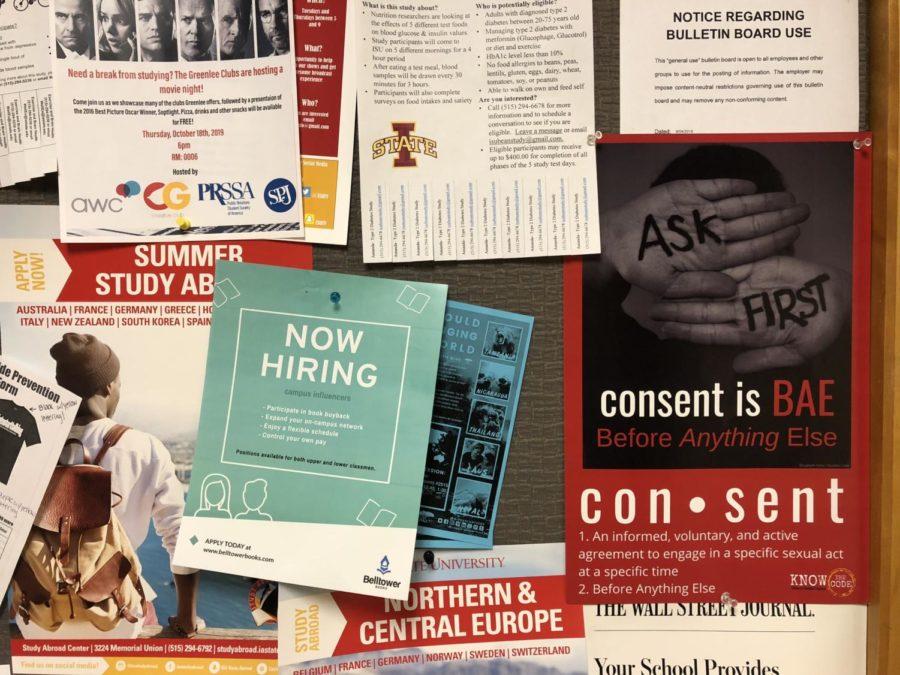Before anything else: Campaign aims to educate Iowa State on the definition of consent
Katlyn Campbell/Iowa State Daily
Posters about consent hang on bulletin boards throughout Hamilton Hall on Oct. 17. The posters encourage people to seek an agreement between two parties before entering into a sexual interaction with another person.
October 17, 2018
No means no. Silence is not consent. Hesitation is not consent. Clothing choices are not consent. Incapacitation is not consent.
“Consent is B.A.E.” is the slogan for a campus-wide sexual assault prevention campaign out of the Office of Equal Opportunities. It aims to educate members of the Iowa State community on the definition of consent, and the complexities that can come with avoiding and preventing instances of sexual assault.
Consent is defined under Title IX as “an affirmative agreement — through clear actions or words — to engage in sexual activity.” It can be defined by both what it is and what it is not, but one thing is for certain — consent comes Before Anything Else.
“Ultimately, what we’re doing is hoping students pause and think, and become more communicative in how they articulate what relationship boundaries and parameters are,” said Margo Foreman, the title IX coordinator and assistant vice president for diversity and inclusion and equal opportunity.
“When I’m in close encounters with someone, and this is where our relationship is going, how do I get to that moment of consent?” Foreman said. “And how do I make sure that it is continued, and agreed upon? What do I do when I get there and the answer is no?”
The initiative aims to create a consciousness around the idea of consent, as well as the idea of personal boundaries within relationships. It aims to educate members of the Iowa State community, particularly students, on new ways to understand consent and sexual violence, and to reconsider how they may have understood it in the past.
“I would say that in most cases, what we find in Title IX complaints is not that there has been a calculated plan to violate someone’s space and be involved with them in an unwelcoming manner,” Foreman said. “But those [violations] happen in the moment, they can happen over the course of a relationship. They’re not necessarily accidental, but they’re not calculated.”
The Office of Equal Opportunity has partnered with many other on-campus organizations and programs, such as Green Dot, Know The Code, the Department of Residence and the Margaret Sloss Women’s Center to create a collaborative message with a larger platform.
“We rely on a collaborative environment,” Foreman said. “I think there is a risk [with being] the only messenger. There is only so much staff here. We need those ambassadors of the message.”
In addition to this campaign, the Office of Equal Opportunity is hoping to continue to expand their educational initiatives surrounding Title IX and sexual violence prevention.
“We have a couple of very exciting programmatic ideas, … hopefully one of [which] comes to fruition,” said Jacob Cummings, an equal opportunity specialist, “I think it’s going to be a very powerful program.”
The campaign features a series of posters. These posters feature various images of potential settings in which the notion of sexual consent may arise.
These posters can be seen on bulletin boards all across campus, with a heavy presence in the many residence halls here at Iowa State.
“We are working with zero budget. We’re not a revenue-generating administrative entity,” Foreman said. “… That [forces] us to be creative, and [to] rely on partners. Those [posters] that you’ve seen in residence halls, … the cost for those was assumed by the Department of Residence.”
Both Foreman and Cummings agreed students and faculty have been receptive to the message so far.
“The campus community is fluid, and transient,” Foreman said. “We may make some changes, [but] the need to educate will continue. The components of what consent is — that definition is not likely to change.”
















